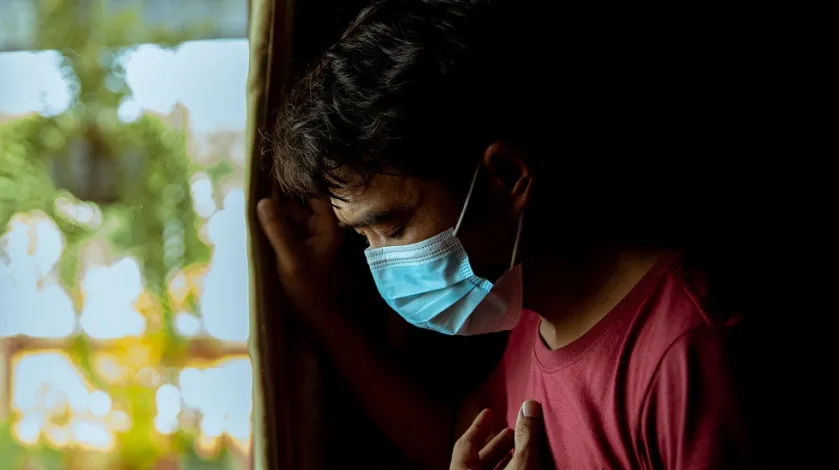Seven Things to Know about Long COVID
Author

Frank Schembri, MD
Nearly three years into the pandemic, we’ve learned a lot about COVID-19.
We know how to protect ourselves from the virus with vaccines, prevent its spread by masking and social distancing, and how to treat infections with antiviral and anti-inflammatory medications.
But we still have much to learn about the condition known as long COVID.
Also called post-acute COVID-19, chronic COVID, or post-acute sequelae of SARS CoV-2 infection (PASC), post-COVID conditions can include a broad range of new, returning or ongoing health problems people experience at least four weeks following a COVID-19 infection, according to the CDC.
Fatigue, shortness of breath, brain fog, memory loss, anxiety and depression are among the most common of the hundreds of long COVID symptoms people have reported in studies being conducted in the U.S and around the world.
One of the largest trials underway is The National Institutes of Health (NIH) RECOVER Initiative, which aims to get a better understanding of long COVID, its symptoms, risk factors and underlying causes.
Frank Schembri, MD, South Shore Health’s Chief of Pulmonary Medicine, discussed the NIH study and gave and update on the most recent clinical and research findings of PASC/long COVID, at a symposium of the Massachusetts Association of Cardiovascular & Pulmonary Rehabilitation.
Here are seven questions on long COVID that Dr. Schembri addressed in his presentation.
What defines PASC and how common is it?
Like the condition itself, PASC has been difficult to define, even by the CDC and other public health agencies. But it has been recognized by patients since the spring of 2020.
Early on in the pandemic, we realized that the expectation of recovery – the World Health Organization (WHO) saying it should be 2 to 3 weeks – was not fitting people’s overwhelming experiences.
It was patients, who confirmed the existence of long COVID by connecting on social media and saying to one another, “I had COVID-19 and I’m not better yet.” Therefore, long COVID has a strong claim to be one of the first illnesses collectively made by patients and defined on Twitter and Facebook.
What were the patients describing on social media? More than 200 symptoms -- including cough, headaches, muscle and joint pain, fatigue, difficulty concentrating, difficulty breathing, circulatory problems, dizziness, and changes in smell or taste.
Quite simply, long COVID isn’t any one thing, it’s a whole lot of things.
Many of those things are similar to the persistent symptoms experienced by patients with Lyme disease and myalgic encephalomyelitis/chronic fatigue syndrome (ME/CFS). Not only are the symptoms similar, but so too is the onset which is often sudden and following a viral infection. Patients are typically highly functioning individuals struck down with disease and partially or totally disabled by the symptoms – yet their exams and blood work are normal.
So significant are the health impacts of PASC that since July 2021, the Americans with Disability Act (ADA) has recognized long COVID as a disability.
What causes PASC?
Studies show many possible causes for long COVID including:
- Organ damage resulting from acute phase infection.
- Complications from a dysregulated inflammatory state.
- Ongoing viral activity associated with an intrahost viral reservoir.
- Autoimmunity.
- Inadequate antibody response.
- Disruption of the microbiome (gut health).
- Microclots
- Other unidentified causes
Does PASC depend on when during the pandemic you had COVID-19?
Yes, there seems to be a connection between the variant of COVID-19 that you had and the chance of developing long COVID.
A study in the UK looked at 41,361 adults that tested positive for COVID-19 between June 1 and Nov. 27, 2021 during the Delta wave, and another 56,003 adults that tested positive between Dec. 20, 2021 and March 9, 2022, when Omicron was dominant. The study showed the overall risk of developing long COVID after Delta was 10.8%; after Omicron it was half that rate or 4.5%.
The type of long COVID symptoms you have may also depend on the COVID-19 variant you had.
An Italian study of 428 patients treated at a post-COVID outpatient center between June 2020 and June 2021, showed that if the COVID infection occurred between June and December of 2020 when the original strain was dominant, the long COVID symptoms were primarily loss of smell and taste (ageusia) and impaired hearing. Those infected between January and April of 2021, when Alpha was dominant were more likely to have long COVID symptoms of myalgia, insomnia, brain fog, anxiety and depression.
Does PASC depend on the severity of your COVID-19 infection?
Yes, research generally suggests that long COVID occurs less often after mild COVID-19 cases than in severe ones. If you’re very sick and hospitalized due to COVID-19 infection, you’re more likely to develop PASC.
However, it’s clear that minimally symptomatic patients can also develop symptoms of long COVID.
With each successive COVID-19 wave, the number of people developing long COVID has been lower, supporting the idea that the type of variant plays a role in whether you are likely to later have PASC.
Does PASC depend on vaccination status?
Undeniably, the best way not to get long COVID, is not to get COVID-19. Any vaccination that prevents you from getting the disease will also prevent you from getting the post sequelae of the disease.
A 2022 meta-analysis in The Lancet, a peer-reviewed medical journal, looked at six studies and all had the same conclusion that vaccination before COVID-19 infection reduced the chance of developing PASC, but did not eliminate the risk.
One study showed that mRNA vaccines were more effective than the Johnson & Johnson vaccine and two studies suggested that two doses of the mRNA vaccine were better than one.
The jury is still out on whether vaccination after the onset of long COVID would help with the symptoms. In the analysis of 11 studies, seven of them reported improvement of PASC symptoms, four studies showed no change, and one showed some patients got worse after vaccination.
Does PASC depend on any other clinical parameters or risk factors?
Long COVID research indicates:
- While men are at greater risk of severe symptoms from COVID-19, women are at greater risk for persistent symptoms from COVID-19.
- Older people have a greater chance of developing long COVID than younger people.
- Those with underlying pulmonary conditions such as COPD have greater risk of developing PASC.
- The risk of long COVID is higher for those with a history of allergies.
- Patients with high BMI (body mass index) and those with diabetes are also at greater risk for PASC.
How do we go about diagnosing and treating PASC?
Because it is such a complex disease, patients should begin with their primary care providers to rule out any alternative diagnosis.
If PASC is suspected, a conservative initial approach should be taken in the first 4-12 weeks, unless there are concerns of a potentially life threatening condition.
Post-COVID conditions involve multiple organ systems, thus a thorough physical examination should be completed.
It is important to note, that no laboratory test can definitively distinguish post-COVID conditions from other conditions and most patients end up getting many traditional studies including chest imaging, echocardiogram, stress tests and cardiopulmonary exercise testing (CPET).
If PASC is the diagnosis, the management of the disease needs to be a team effort and should include:
- A partnership with medical, mental and physical health specialists working collaboratively.
- Working with patients to set achievable goals and expectations through shared decision making.
- Honesty and transparency about the unknowns of long COVID.
- Symptom management/therapy.
- Lifestyle modifications (smoking, sleep, diet, exercise).
- Physical and occupational therapy, speech and language therapy or vocational therapy, neurological rehabilitation for cognitive symptoms.
- Social service support/patient support groups.
- Medication trials to target inflammation, residual virus, reestablishing the gut microbiome, microclots, anxiety/depression and other symptoms of PASC.
Tell us more about the NIH RECOVER Initiative study
The RECOVER Initiative is the largest ongoing long COVID study. NIH has funded $1.15 billion for long COVID research with the RECOVER study receiving more than $500 million.
It involves 17,680 patients (9,277 are enrolled so far) from 200 sites around the U.S. and multiple cohorts – adult, pregnant adult, children, and autopsy. Those patients will be followed for 4 years prospectively for symptoms, laboratory results and biospecimens.
The three goals of the study are to learn:
- What symptoms after COVID-19 infection are most helpful for identifying PASC? Are there different types of PASC with distinct groups of symptoms?
- How do PASC symptoms change over time and how long do they last? Are there certain risk factors for the severity of PASC over time after COVID-19 infection?
- What are the underlying biological causes of PASC? Is there overlap with other post-viral syndromes like ME/CFS? Does PASC lead to increased risk of other chronic diseases or impact child development?
Some final takeaways on long COVID
PASC is characterized by multiple different subtypes and depending on the definition, occurs in 30% to 50% of patients.
The risk of long COVID increases for those with severe disease, the unvaccinated and those infected with earlier variants of the virus.
PASC is best treated through a multidisciplinary approach of speech pathology, physical therapy, occupational therapy, medical and mental health therapies.
A drug regimen for treating PASC would probably include multiple mechanistic drugs.
Frank Schembri, MD, is Chief of Pulmonary Medicine at South Shore Health and Adjunct Assistant Professor of Medicine at the Boston University School of Medicine. Learn more about heart and pulmonary care at South Shore Health.
Author

Frank Schembri, MD








